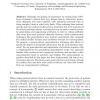Free Online Productivity Tools
i2Speak
i2Symbol
i2OCR
iTex2Img
iWeb2Print
iWeb2Shot
i2Type
iPdf2Split
iPdf2Merge
i2Bopomofo
i2Arabic
i2Style
i2Image
i2PDF
iLatex2Rtf
Sci2ools
139
Voted
DAWAK
2006
Springer
2006
Springer
Priority-Based k-Anonymity Accomplished by Weighted Generalisation Structures
Abstract. Biobanks are gaining in importance by storing large collections of patient's clinical data (e.g. disease history, laboratory parameters, diagnosis, life style) together with biological materials such as tissue samples, blood or other body fluids. When releasing these patientspecific data for medical studies privacy protection has to be guaranteed for ethical and legal reasons. k-anonymity may be used to ensure privacy by generalising and suppressing attributes in order to release sufficient data twins that mask patients' identities. However, data transformation techniques like generalisation may produce anonymised data unusable for medical studies because some attributes become too coarse-grained. We propose a priority-driven anonymisation technique that allows to specify the degree of acceptable information loss for each attribute separately. We use generalisation and suppression of attributes together with a weighting-scheme for quantifying generalisation steps. O...
| Added | 22 Aug 2010 |
| Updated | 22 Aug 2010 |
| Type | Conference |
| Year | 2006 |
| Where | DAWAK |
| Authors | Konrad Stark, Johann Eder, Kurt Zatloukal |
Comments (0)

